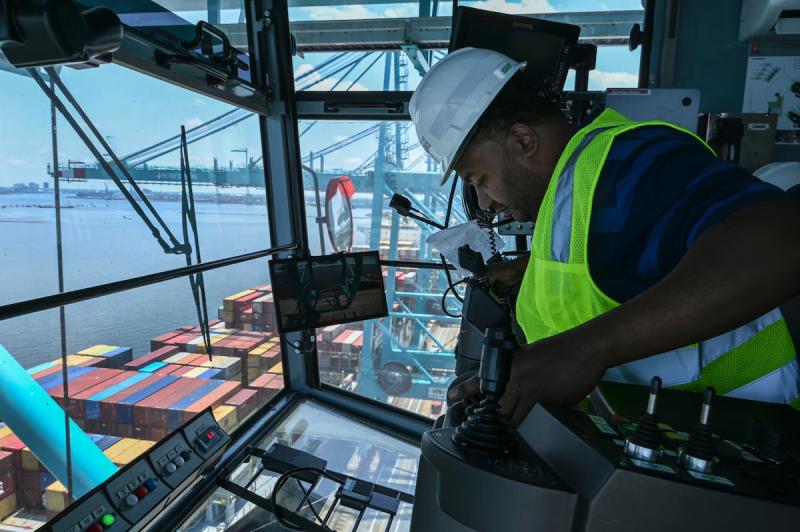Opinion: The real reason 47,000 dockworkers are on strike
By: Heather Long (The Washington Post)


Kamala Harris approves this recession. Or not. It all depends upon which AI bot is advising the campaign at the moment.
Heather Long (the seed author) puts forward a plausible reason for the strike. We have all observed how automation has displaced and replaced middle class jobs. And the advent of artificial intelligence does suggest the pace of automating work will quicken. But that speculation over automation concerns completely ignores the simple fact that union demands to increase labor costs won't make automation less appealing. And AI enhanced automation won't go on strike and disrupt the economy.
A more likely (and less esoteric) reason for the strike is that the union has found an attractive pooch. And the union must be true to its nature. Too bad the country cannot abort the consequences.

For the first time since 1977, dockworkers are on strike at all East Coast and Gulf Coast ports. Some 47,000 workers have stopped unloading the massive containers full of everything from cars to toys to bananas. News stories have focused on how the strike will affect consumers. Will there be enough toys for Christmas? Which grocery prices will rise? It doesn’t require a PhD in economics to understand that, the longer this goes on, the more Americans will notice. But the bigger reason everyone should pay attention is that this is an early battle of well-paid workers against advanced automation. There will be many more to come.
The union representing the dockworkers — the International Longshoremen’s Association — is demanding higher pay and benefits. There’s also a dispute over where cameras can record workers. But these issues could be settled pretty easily with the United States Maritime Alliance, which represents the major shipping lines and port terminals. Just look at the West Coast dockworkers’ contract deal last year that significantly hiked pay, or the record wage gains that United Auto Workers won last fall. The difficult issue at the heart of this strike is whether machines will displace workers earning up to $39 an hour at the ports.
The dockworkers’ last strike in the 1970s was also over technology. Back then, the shipping industry was beginning to use big containers, because they are much easier to handle than individual boxes. The 44-day strike ended with a substantial pay hike and a guaranteed income for union members, whether they worked or not.
Today, the shipping industry is at the forefront of a second revolution. It is now possible to run a dockyard with almost no humans present. The two key jobs — operating cranes and moving containers around — can be automated. Cranes pick up the heavy containers from the ships and sort them on shore. Then trucks carry the containers from the dock to wherever they need to go next — a railroad or trucking hub or storage facility. People are needed to oversee things, but their role is now more akin to air traffic control. Maintenance and IT jobs also remain. But the bottom line is: Fewer workers are needed.
Thomas Little, who has been working at the Port of Hampton Roads since 1969, has seen firsthand how the Virginia ports have provided middle-class jobs for hundreds of families, especially workers of color. “No one really wants a strike,” Little told me. “But we cannot stand by at this point in time and allow employers to implement equipment to eliminate our jobs.”
There’s a wider context here. Only 63 ports in the world had this advanced automation by 2022. That’s a tiny fraction of the roughly 1,300 container terminals in the world. Port operators make it sound inevitable that machines will come — though it’s a hefty upfront expense and the equipment usually comes from China, which the Biden administration now sees as a security threat. (Efforts are underway to build cranes in the United States.)
In this country, three terminals (in Los Angeles and Long Beach) are considered fully automated. Another three (one in New Jersey/New York and two in Virginia) are classified as semi-automated, meaning that machines do some of the sorting. A 2022 study by the Economic Roundtable of Los Angeles found that 572 jobs a year were lost (about 5 percent of the workforce) after automation in California. The study was funded by the West Coast dockworkers union.
The fact is, container ships are getting bigger and bringing more cargo. Ports that want to operate 24 hours a day to attract larger ships are likely to automate. (It’s easier to schedule machines 24/7 than humans who get overtime.) But not every port needs this.
Geraldine Knatz, a former executive director of the Port of Los Angeles who is now a professor at the University of Southern California, notes that ports that introduced automation say they have experienced increased safety and more standardized performance. But her research shows that, in her words, “None of the U.S. terminals realized the level of benefits for reduced labor costs that they anticipated, and two overestimated the reduction in labor costs.”
Rotterdam was the first major port to automate and is often held up as the global ideal. But its enhancements also came with generous early-retirement packages for workers. A similar compromise might be possible in the U.S. strike now.
The East Coast dockworkers understand what’s happening around the world. They know about shipping companies’ hefty profits in recent years. And they know President Joe Biden is unlikely to force them back. (The union has been clear that it will continue unloading any military cargo, and the strike doesn’t affect cruise ships.) For now, the workers feel emboldened.
This strike will make a difference in what’s available on your local store shelves. But the ramifications are bigger than that. Disputes like this can set a precedent for what happens when machines come for all kinds of jobs.




Hey, let's drive up operating costs to counter the appeal of automation. What a great idea! Will the artificial intelligence enhanced news stories be sympathetic toward the workers or the robots?
The issue highlighted by the strike (but won't be reported) is the country's dependence on imports. Consumers are already fed up. Another supply chain screwup won't earn a lot of sympathy. It won't be long before those consumers begin demanding that Joe Biden (and Kamala Harris) intervene in negotiating a ceasefire. God, we're doomed.
Actually, it isn't, the first was on the West Coast with the ILWU years ago.
And 50 years later, the only fully automated docks in the US are located on the west coast. The lesson learned?